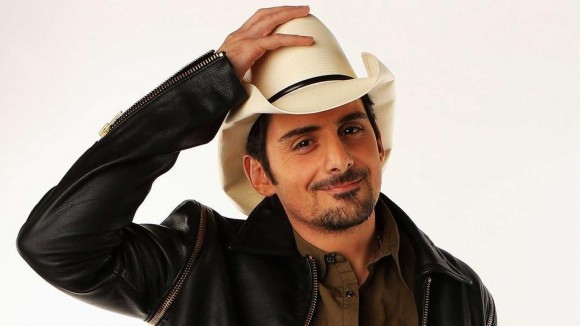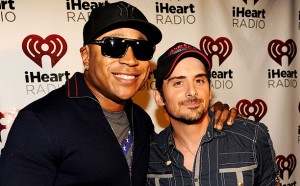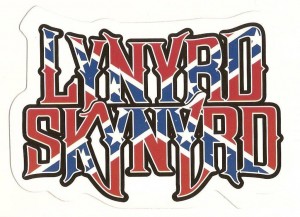Why Accidental Racist is racist
Posted on October 24, 2013 By Mike Ross Entertainment, Front Slider, Music
 Country music, at least the stuff you hear on commercial radio, has been taking a lot of heat for being really, really dumb.
Country music, at least the stuff you hear on commercial radio, has been taking a lot of heat for being really, really dumb.
It’s a male-dominated world that celebrates rednecks who drive pick-up trucks, love their mamas, go to church and hate their blue collar jobs so much that they can’t wait until Friday to go to the bar to listen to country songs about rednecks who drive pick-up trucks, love their mamas, go to church and hate their blue collar jobs so much that they can’t wait until Friday to go to the bar … and so on.
You can almost feel your own brain cells dying.
One guy has ridden above the herd, however: Brad Paisley, the triple threat singer, songwriter and guitar picker from Virginia who plays Rexall Place Saturday, Oct. 26. He actually puts some thought into his material, but even then often gets lumped into the Dumb Country Movement. Considering some of his No. 1s over the years, such as “I’m Gonna Miss Her (the Fishin’ Song)” or “Mud on the Tires” or “Ticks,” as in “I’d like to check you for ticks,” his critics might have a point.
Yet there are flashes of humour and insight throughout Paisley’s work that you don’t often get from his behatted peers. “This is Country Music,” the title track of his 2010 album, is interesting even for being another one of these love letters to country music – a country song about country songs, basically: “It ain’t hip to sing about tractors, trucks, little towns, and mama, yeah that might be true, but this is country music and we do.”
 This attitude of defensive self-awareness came to full flower recently in one of the most controversial songs Paisley has ever recorded: “Accidental Racist.” An ebony-and-ivory-style duet with LL Cool J, the song starts with an awkward encounter in a coffee shop. Paisley is wearing his Lynyrd Skynyrd shirt, emblazoned with elements of the Confederate flag, which gets a cold reception from the presumably African-American barista.
This attitude of defensive self-awareness came to full flower recently in one of the most controversial songs Paisley has ever recorded: “Accidental Racist.” An ebony-and-ivory-style duet with LL Cool J, the song starts with an awkward encounter in a coffee shop. Paisley is wearing his Lynyrd Skynyrd shirt, emblazoned with elements of the Confederate flag, which gets a cold reception from the presumably African-American barista.
It’s worth quoting Paisley’s response at length, “The red flag on my chest somehow is like the elephant in the corner of the South, and I just walked him right in the room, just a proud rebel son with an ‘ol can of worms, lookin’ like I got a lot to learn. But from my point of view I’m just a white man comin’ to you from the Southland, tryin’ to understand what it’s like not to be. I’m proud of where I’m from, but not everything we’ve done, and it ain’t like you and me can rewrite history. Our generation didn’t start this nation. We’re still pickin’ up the pieces, walkin’ on eggshells, fightin’ over yesterday, and caught between Southern pride and Southern blame.”
LL Cool J gets his turn later on, “When I see that white cowboy hat, I’m thinkin’ it’s not all good. I guess we’re both guilty of judgin’ the cover not the book. I’d love to buy you a beer, conversate and clear the air. But I see that red flag and I think you wish I wasn’t here.” And so on.
Paisley and his partner caught a storm of criticism when the song came out this spring, including in a parody skit on Saturday Night Live – mainly for being, you guessed it, racist.
Is it? “Racist” is a hell of a word to throw around. We need proof, sober advice from experts. Mari Sasano, a MacEwan University instructor who has studied and written about race and gender relations for many years, actually offers praise for the country star.
“It’s an honest response to something like that happening to him,” she says. “In a way, he’s making himself a bit of a target for saying the things he does. He’s probably not had to think very deeply about racism, because it’s not something that affects him directly. So to notice that races are sometimes treated differently is really good. Noticing is better than not noticing at all. He did notice the server at Starbucks responded negatively to what he was wearing, and he did draw some lines to where he thought that came from, which is good.”
There is a big “but” here.
Sasano goes on, “The reason why it’s a problem is most racism these days is accidental – but that doesn’t make it any less harmful.”
 At issue (again) is the Confederate Flag, which is seen by many people as a symbol of hate, as a reminder of a shameful time when Americans kept slaves. Charlie Daniels and Skynyrd fans would no doubt disagree with this assessment of their beloved “Stars and Bars,” but the problem this particular flag seems to present with race relations isn’t going away. Quite the opposite. It’s coming out in the open.
At issue (again) is the Confederate Flag, which is seen by many people as a symbol of hate, as a reminder of a shameful time when Americans kept slaves. Charlie Daniels and Skynyrd fans would no doubt disagree with this assessment of their beloved “Stars and Bars,” but the problem this particular flag seems to present with race relations isn’t going away. Quite the opposite. It’s coming out in the open.
Sasano says it’s unfortunate that in much the same way as the once-sacred swastika symbol was forever ruined by the Nazis, the Confederate Flag has been co-opted by a number of racist groups. So for any reasonable, non-racist person still displaying it, “At the very least, it’s ambiguous. And at worst, it’s just ignorant if you’re not aware that the Confederate flag can be taken that way.”
If most racism is accidental – perpetuated by little things like racist jokes shared between two friends, one who may even be the minority depicted in the joke, because it affects more than just the two friends, Sasano says – then how do you fight it?
Noticing is a good start.
“Most people mean well,” she says. “Most people don’t want to live in a racist world, but sometimes their actions, because they’re not aware of it or think it’s not important, might be racist actions.” Paisley, she adds, seems to have taken a positive step forward, but “he doesn’t quite get there.”
Maybe there’ll be a sequel.











